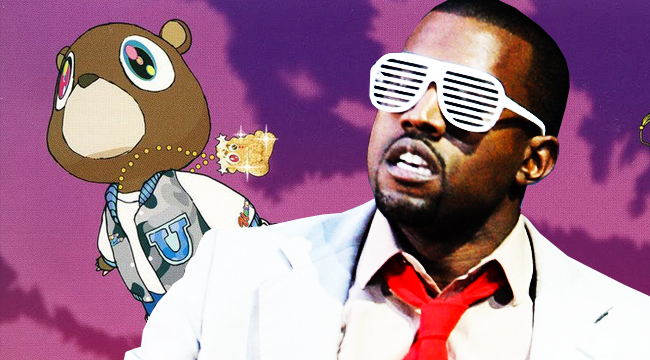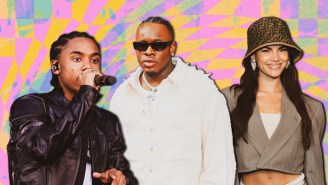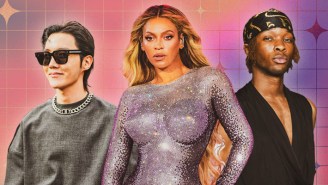
Saturday, June 27, 2015. 130,000 people are standing in the middle of a field in England, gazing in wonder at a giant glowing pyramid. It’s the annual Glastonbury festival and the object of their amazement, Kanye West, is stalking the stage like a caged lion. A massive lighting rig hangs over his head, flashing varying arrangements of a yellowed hew. Just before ripping into “Gold Digger” a thought enters his brain, a claim, a boast he wishes to share with his army of worshippers.
“I’m going to say this tonight, ‘cause 20 years from now, 30 years from now, 40 years from now I might not be able to say it,” he begins. “Play it, I’m gonna say it right before the beat drop,” he commands his musical director Mike Dean.” The sound of Jamie Foxx’s voice fills the fields, and then Kanye drowns him out. “You are now! Watching! The greatest living rock star on the planet!” All hell breaks loose below.
Who knows what the landscape of pop music, rock music, or rap will look like, who will rise, who will fall in two, three or four decades’ time, but in that moment, Kanye was right. He was the greatest living rock star on the planet. Actually, he had been for eight years leading up to that moment. From the day the “Louis Vuitton Don” closed out Ye’s College trilogy with the release of his third album Graduation, Kanye transcended petty things like genre and became the true rock star he always proclaimed himself to be.
Perhaps more than any other artist in music, Kanye creates his best work with a chip on his shoulder. You might call him the Aaron Rodgers of rap. Someone who was passed over at the beginning of his career for shinier prospects only to prove the doubters wrong time and time again in glorious, logic-defying fashion.
On his debut album The College Dropout he proved that he could rap. On the follow-up Late Registration, he showed that not only could he rap, he could re-mold the field in his image, giving space to a new generation who didn’t necessarily fit in the predominate “gangsta” mold. On Graduation, he sought to break free from rap entirely, widening his palate with a shocking finesse, and infusing his beats with elements of classic rock and contemporary dance to create this towering monolith of technicolor brilliance.
As crazy as it sounds, he completely and totally pulled it off. This man, this mad genius, took a sample of the Steely Dan hit, “Kid Charlamagne,” an ultimate in Yacht rock, and used it as the sonic backbone of the second song on his record the breezy, synth-slathered “Champion.” And you know what? It knocked! Yes it did. He also pulled stuff from “P.Y.T.” by Michael Jackson, and “Someone Saved My Life Tonight” by Elton John. Then on the third track, he went to the exact opposite end of the spectrum, pulling a sample from a track cooked up by pair of French speaking robots to create one of the biggest singles of his career. Who, but Kanye West?
I’ll tell you what, as soon as I heard “Can’t Tell Me Nothing” for the first time I knew it was a wrap. May 2007. I’m driving my car around the dust-swept streets of El Paso, Texas. The radio was already blasting when a DJ comes on says something about the newest single by Kanye West and my heart rate jumps. I reach for the volume knob and crank it just in time to catch Yeezy ululate those first few “La, la, la’s.”
The beat drops and the speakers nearly explode. “I had a dream I could buy my way to heaven / When I awoke, I spent that on a necklace.” Cold as f*ck. My mind is racing, trying to digest this swaggering monstrosity of unapologetic braggadocio. Then, and I remember this moment as clear today as when I first heard it over 10 years ago, Kanye raps, “Old folks talking ‘bout ‘Back in my day’ / Well homie this is my day.” I nearly drove my car into oncoming traffic.
In a cover profile run by Rolling Stone, West shared his clear-eyed vision about what it meant to be a rock star and how that differed from being a rap star. “Nobody represents hip-hop like Swizz Beatz,” he said. “His party records, his ‘Get out of my face’ sh*t is what hip-hop is about. It’s about ‘boom, bap, original rap, boom, bap, throw your hands in the air, let’s go.’ Hip-hop is black bravado times a thousand.”
“I am a rock star. Because rock stars don’t need security, and I can go to dinner and chill. Rock stars can speak well, or hop on a plane to Paris if they feel like it. Rock stars can catch cabs, they don’t need entourages and they don’t have to pop out of limos all the time. Rock stars can wear the same clothes every day, they can get their shoes dirty and they don’t need a f*ckin’ haircut. Rock stars can pull their dick out in public and then go rock 20,000 people. Rock stars have a wife and kids. Rock stars do the drugs that they want, and they can get over drugs, or they don’t get over drugs and it f*cks them up. Rock stars can give their f*cking opinion without having to deal with… what’s that thing I get dealt with every day of my life? Oh, yeah. Backlash.”
To be a rock star, to make a rock star album, Kanye studied at the feet of the masters. “I applied a lot of the things I learned on tour [in 2006] with U2 and The Rolling Stones, about songs that rock stadiums. And they worked!” he told Spin. “I way simplified my rap style on this record. [Those crowds] were looking at me like, ‘I don’t know what you’re talking about.’” Adding, “Before, the music was more self-indulgent, and now it’s more about everyone. I’m talking lyrics and chorus-wise. Giving them something to sing along with. Even a song like ‘Can’t Tell Me Nothing,’ that’s a rock chorus over straight ghetto drums.”
Before we go any further, we have to talk about “Stronger.” Commercially and culturally, it’s the biggest hit single of Kanye West’s career. You couldn’t turn on a radio or watch an award show in 2007 and 2008 without hearing Kanye stutter “Th-th-th-th-that, that don’t kill me.” And that Hype Williams-directed video where he’s wearing the shutter shades? Absolutely iconic.
“I played him Daft Punk music and played him, ‘Harder, Better, Faster, Stronger,’ but I’ve never taken credit for him sampling that, because when he told me he wanted to sample it, I told him he shouldn’t,” A-Trak, who was working as Kanye’s DJ at the time told me in an interview at this year’s Lollapalooza. “My thing was he didn’t know the song, and by sampling it, I felt that it was already such a big hit from not even that long ago that it might feel a little cheap to sort of jump onto that track… he proved me wrong.”
“We came home from tour. He made the beat and sent it to me,” A-Trak continued. “He like, slowed it down, did a really different drum pattern, added chords to it and right away I was like ‘This is f*cking great! You win!” According to A-Trak, the effort to create the song didn’t end there however. “He spent a long time working on the verses. He recorded his verses months even after that. Then, twelve or thirteen different mix engineers tried to mix it. I even tried to mix it. No one could get that mix right for the longest time. That song was a process, but I think it makes sense looking back now because it was such a different turn, musically for hip-hop.”
The Willy Wonka stroll through Kanye’s manic, musical imagination on Graduation doesn’t end with “Stronger.” There are a pair of piano ballads; The plaintive, “Everything I Am” where Kanye does the one thing that people accuse him of being incapable of — showing self-awareness, and of course the bracing and the wistful ode to Chicago, “Homecoming” featuring Coldplay singer Chris Martin. There’s also a pair of swaggering, club bangers like “Barry Bonds,” which gets a lift from peak-era Lil Wayne, and the gloriously sloppy “Drunk And Hot Girls.” A throwback to his chipmunk-processed past on “Good Life.” A tribute to the man who gave him his break in the industry, Jay-Z, on “Big Brother.” Jay actually rolls through to co-sign the project on the intro track “Good Morning.”
Then you have what might be the best song on the entire record, “Flashing Lights.” Tucked near the back end of the album, the song is pure ear candy, filled with dramatic strings, scintillating synth melodies, sonic boom level handclaps, and a dizzying vocal accents courtesy of Dwele. While the subject matter is as old and poured over as any in the history of popular music — the lingering effects of heartbreak — only Kanye can pull off emptiness with as much style and flair. “Feeling like Katrina with no FEMA / Like Martin with no Gina / Like a flight with no visa / First class with the seat back, I still see ya.”
Graduation dropped officially dropped on September 11, 2007 and completely demolished the sales numbers of 50 Cent’s competing album Curtis, putting an end to a months-long manufactured beef that benefited both artists in the end. Kanye’s work debuted at No. 1, selling 957,000 copies in its first week alone. To this day, it remains his best-selling work, and given the way streaming number are accumulated, will probably hold that distinction forever.
Ten years ago, Kanye told Spin that, “Every year I learn more. Times are still scary, but I got to sit down with Daft Punk and Madonna, and with a lot of incredible individuals, and learn from them. I’m gonna keep making music so that 10, 20 years from now, I’ll be able to be where Mick [Jagger] is. Where Bono is.” While his ambition is obvious, his projections were downright humble. Kanye is as much a rock star today as Mick and Bono ever were. Bow in the presence of greatness.






